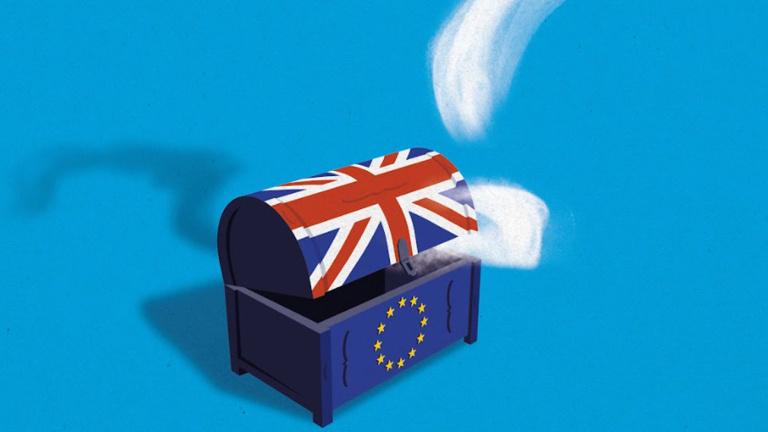
High stakes: Brexit, security, and defence
Brexit comes at a critical moment for the UK, with its global aspirations, and for the EU, as it seeks to revive enthusiasm for the European project through a series of security initiatives. Failure to reach agreement will damage all concerned in the short term, but may leave the EU more focused and capable in the longer term.
Britain goes global
Prime Minister May presented the first glimpse of her plan for Britain’s post-Brexit foreign and security policy on 17 January 2017 in a speech at Lancaster House, replete with no less than 18 references to ‘Global Britain’. The term was enthusiastically adopted by her government, but remains largely unformulated in policy terms. The UK government called for a ‘deep and special partnership with the EU that goes beyond existing third country arrangements’ in a position paper on security, defence, and development of 12 September 2017. May then reassured her European partners in Florence on 22 September that the UK’s ‘determination to defend the stability, security and prosperity of our European neighbours and friends remains steadfast’.
The UK’s claim to a bespoke post-Brexit relationship with the EU rests on its past and current contributions to the EU’s Common Security and Defence Policy (CSDP) and, for internal security, upon its contributions to the collective effort to counter terrorism and organised crime, as well as to defend against cyber and hybrid threats. The May government has reinforced the sense of entitlement by noting that the UK’s defence expenditure is the largest in the EU (and second largest in NATO), that it has the largest defence industry, and that it has contributed to the majority of CSDP operations and missions.
Yet, by the time of the Munich Security Conference in February 2018, the underlying message had subtly shifted. Setting out the government’s negotiation position, May called for ‘a new Treaty to underpin our future internal security relationship’. Regarding security beyond the EU, she called for a looser ‘agreement’, observing that other forms of association, such as bilateral or ad hoc groupings, could incorporate the UK.
Leadership and diplomatic support… but not many boots
A closer examination of the UK’s actual record, based on data from the European University Institute, shows that of the 35 past or current CSDP missions the UK contributed to 25, with an average of 15.72 personnel per mission. Across all the missions, the UK’s personnel contributions equalled 2.3% of the total contributions by EU members (or 4.3% of those operations and missions to which it contributed). The UK’s contributions pale in comparison to France, Italy, and Spain, which have contributed appreciably more to civilian and military operations overall. On only one occasion, a regional maritime capacity building mission for the Horn of Africa and the Western Indian Ocean (EUCAP NESTOR), has the UK led the personnel contributions (with 19 personnel). Angus Lapsley, former UK Ambassador to the Political and Security Committee, and others have argued that the UK’s contributions to CSDP operations and missions have tended to be ‘more about leadership and diplomatic support’.
Significantly, all except one of the CSDP operations and missions to which the UK did not contribute were in Africa. In nearly all of these, France assumed the lead, also tying its leadership role to its own strategic interests. This has implied greater commitments of personnel and resources, often as ‘framework nation’. Africa operations in which the UK has been involved (ATALANTA, SOPHIA, and EUCAP Nestor) have focused on protecting the integrity of sea-lines-of-communication (SLOCs). For ATALANTA, the UK provides the operational headquarters (Italy and Spain are vying for its post-Brexit relocation). Presumably, post-Brexit the UK will continue to contribute through NATO, thus paradoxically reinforcing the need for parallel operations with the same objectives.
A similar pattern is evident in the UN. The majority of UN peacekeepers since 2000 have been deployed to sub-Saharan Africa, which is of relative strategic insignificance for the UK, compared to the Balkans, Afghanistan, and Iraq.
Prima facie it could be concluded that the EU’s security operations in Africa, especially sub-Saharan Africa, will be little changed by Brexit. More generally, it is difficult to avoid the conclusion that the UK has exaggerated its contribution to CSDP operations and thus the basis upon which it can insist upon a bespoke security and defence relationship. For the UK the critical question is whether it will wish to associate with CSDP missions or operations when it has no say in shaping their underpinning priorities and decisions.
Navel gazing
The UK’s primary post-Brexit security interest lies in continued association with aspects of the EU’s internal security, not the external dimensions, as Michel Barnier’s slide of 15 May (reproduced in this volume) suggests. The UK wishes to maintain its access to, as well as contribute to, the European Arrest Warrant, the second-generation Schengen Information System (SIS II), the European Criminal Records Information System (ECRIS), and the Passenger Name Record (PNR) database, alongside the relevant EU agencies (notably the EU Agency for Law Enforcement Cooperation, Europol). British interests are clearly matched on the EU side by the desirability of securing continued UK input into the databases. Nevertheless, the question of data protection and whether the UK will accept legal recourse, presumably through the European Court of Justice, will be critical. May has been contradictory on this point. She vowed to end the jurisdiction of the Court in her Lancaster House speech, but appeared to accept it in this context at the Munich Security Conference.
Failure to find agreement on the nominally internal aspects of security could have implications for North Africa and the Sahel, where efforts to stem irregular migration, the growth of jihadist groups, trafficking, organised crime, and terrorism are already proving challenging. Lack of access to the relevant databases would leave the UK more vulnerable and weaken the EU’s efforts in these regions. The ongoing uncertainties over Gibraltar and Cyprus (both of which may be relevant in future military deployments and intelligence) and lack of EU access to UK expertise and funding may similarly thwart EU efforts going forward. The prospect of diminished overall post-Brexit EU funding may reduce the Union’s leverage at a time when the EU is intent on externalising its border management and increasing defences
Moving ahead without Britain?
The EU has been far from idle since the UK’s June 2016 referendum. A flurry of initiatives in EU security and defence followed the unveiling of the Union’s Global Strategy, which appeared only days after the referendum. This led Federica Mogherini, the High Representative, to assert that ‘more has been achieved in the last ten months than in the last ten years’, a statement she repeated at the 2017 edition of The State of the Union conference in Florence. This progress was, at least in part, due to the UK’s anticipated exit from the EU. The ambition is to move towards a European Defence Union featuring coordinated defence reviews and a legal framework to attain shared common goals alongside Commission funding for developing the necessary capabilities.
Even if much of this progress to date exists primarily on paper, it nevertheless raises broader questions about the extent to which UK defence industries, some of which are multinational, will have access to EU research and development funding. More coordination at the European level, along with pooling and sharing capabilities, may ultimately challenge longer-term interoperability with the UK.
Actions conjointes?
The UK’s post-Brexit bilateral security ties may be of most consequence for Europe’s security. None is more important than France. The Anglo-French Combined Joint Expeditionary Force could conceivably provide a useful backstop. The UK and France may also support each other on their respective strategic priorities, as outlined at the January 2018 Anglo-French summit at the Royal Military Academy Sandhurst, where the UK agreed to provide Chinook helicopters to support France’s ongoing BARKHANE operation, in addition to the existing RAF strategic air transport flights. France has agreed to deploy French troops to the UK-led NATO battlegroup in Estonia in 2019 as part of the Alliance’s Enhanced Forward Presence.
Bilateral security relations may also be strengthened through President Macron’s European Intervention Initiative (EII) which, while lacking in specifics, is intended to be launched ‘with partners that have the necessary military capabilities and political will’. France is anxious to find ways for post-Brexit UK to ‘opt-in’ to European defence and security, and the EII could, in time, offer the potential for multilateral cooperation outside the EU and NATO.
If the EU-level initiatives unveiled in 2016 fail to materialise, the onus may again fall on France and the UK, as the most militarily capable and experienced European powers, to provide the backbone of Europe’s harder autonomous security guarantees. This would put the focus of security cooperation outside the EU and probably NATO, relying instead on the EII or flexible coalitions of the willing. This could open the way for more trade-offs between UK and French strategic interests.
Conclusions
The stakes are high for all concerned. For the UK it is inconceivable to be truly ‘global’ without being European. This may well imply a compromise whereby to ensure continued access to EU databases, the UK may have to demonstrate more concretely its willingness to contribute to the EU’s external security. For the EU, much of the hoped-for reinvigoration of the European project rests on the success of the various security initiatives unveiled in 2016. Given the UK’s preference to deploy high-end military resources, rather than rank and file infantry, the direct effect of Brexit on EU crisis management operations in Africa will likely be small, with the exception of maritime operations. It is, nevertheless, possible that bilateral defence and security ties, particularly those between the UK and France, may provide openings for strategic trade-offs and joint involvement in African security.
About the author
Simon Duke is professor at the European Institute of Public Administration (EIPA), Maastricht, and senior research fellow at Maastricht University. He is also author of ‘Will Brexit Damage our Security and Defence? The Impact on the UK and EU’, Palgrave due later in 2018.
Twitter: @eu_eipa
Read the full magazine issue







